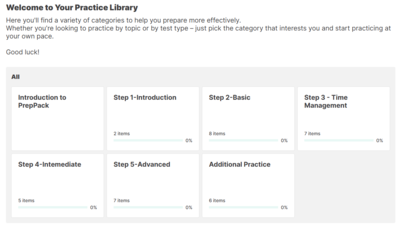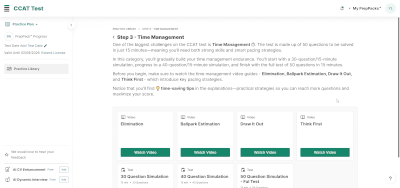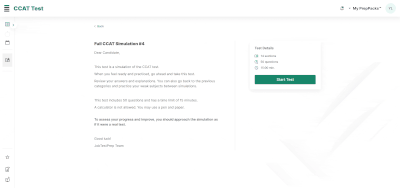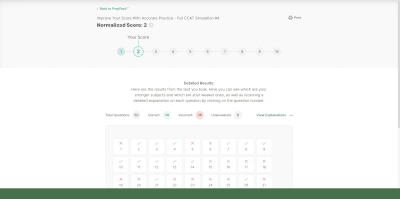The CCAT is a race against the clock. Beat it with smart prep.
The Criteria Cognitive Aptitude Test (CCAT) is a pre-employment assessment designed to select high-performing individuals for a variety of jobs.
To achieve this, it requires test-takers to solve 50 questions covering numerical, verbal, spatial, and logical reasoning in only 15 minutes. Our course is carefully curated to help learners with the test's two challenges:
- develop an intuition for solving these types of questions
- Build and carry out strategies for time management
Our CCAT PrepPack includes:
- Access: 1 Month
- CCAT Introduction Test & Interactive Study Guide
- Focused Practice Drills & Full-length CCAT Simulations
- Additional Practice Material for Each of the CCAT’s Topics
*Each practice test is coupled with full explanations and score reports.
Focuses and advntages of practicing with the CCAT course:
- Take advantage of a structured approach
The course is divided into discrete steps. This allows you to build your skills bit by bit. The six full-length CCAT simulations are spread out, so you can evaluate your strengths and weaknesses at every stage.

- Train for both speed and accuracy
To handle the test's stress-inducing time limit, we have included a time management section with four video guides and three short simulations.

- Get a feel for the real exam
The course's sample tests mimic the flow and gradual increase in difficulty of the real exam. The aim is for you to feel comfortable with the actual format. In addition to the full simulations, we have 20 practice tests that focus on specific areas, so you can practice where you feel the weakest. Short on time? Go straight to the area with the most potential for improvement.

- Track your progress
After completing each test, you will receive a detailed report, allowing you to analyze where you stand, what needs more work, and how far you've come. The report includes full explanations to all questions.

Who Are We?
JobTestPrep offers prep packs for pre-employment exams, both cognitive and personality, written and designed by psychometric testing experts.
We understand how frustrating these exams are. While they help companies streamline and automate recruitment, they make many candidates feel unseen, as if they are reduced to a test score rather than a unique set of skills and traits.
Our goal is to help you gain control of your recruitment. Ace your exam so you can move on and show your recruiters what you can actually do.
About the Author:
For more practice, check out our Free CCAT Practice Test.
FAQs
The CCAT is a cognitive ability test that measures your critical thinking and problem solving skills using 50 verbal reasoning, spatial reasoning (abstract), math, and logic questions. These questions must be answered within a 15 minute time limit, leaving only 18 seconds per question.
What makes the Criteria Cognitive Aptitude Test so challenging is the combination of two elements. First and foremost is the time limit, which is there to measure your ability to solve problems under pressure. The ticking clock can make even simple questions challenging, and as the test progresses the pressure will mount - this is why time management needs to be one of your top priorities.
The second element is of course the questions themselves, which alternate between four topics and grow in difficulty as the test progresses and your time grows shorter. This means you need to adapt seamlessly to the question's topic and difficulty - moving from a intermediate word problem to a hard spatial reasoning question for example.
The CCAT is taken on Criteria's On Demand Assessment platform, a designated testing platform for all of Criteria's assessments.
Check the following video to see the most common question types that appear on the test and how to solve them efficiently:
A cognitive aptitude test measures arguably the most essential aspects of the human mind. Cognition is the process that allows you to perceive reality, or in other words to analyze the information that you encounter every moment.
Cognitive tests are used for a variety of reasons, from doctors identifying cognitive impairment to companies or universities selecting the right candidates for professional or educational purposes.
In our case, the Criteria Cognitive Aptitude Test is used to measure cognitive aptitude in candidates for a variety of positions, specifically verbal, numerical, logical, and abstract reasoning abilities.
There are numerous cognitive ability tests that differ in question type, difficulty and format – leading tests include Cognify, PI, & P&G.
Although the passing score on the Criteria Cognitive Aptitude Test largely depends on the position you are applying for, there are certain scores that will all but guarantee that you pass.
Answering 31 questions correctly (this number is known as your raw score) will typically put you above the top 20th percentile score of those who took the CCAT, and this is considered a relatively good score.
A raw score of forty questions right out of 50 will put you among the top percentile scores of any list of candidates, and an excellent chance of landing the job.
For more information on this subject, visit our CCAT scores page.
The CCAT test is notoriously difficult, mainly due to the extreme time pressure it imposes. With 50 questions to answer in just 15 minutes, you're left with only 18 seconds per question, making preparation crucial.
Although the initial questions may appear relatively straightforward, the difficulty increases as you move forward, intensifying the pressure of the ticking clock. The key to CCAT test preparation is practicing your ability to solve problems quickly under these challenging conditions.
Our experience shows that practicing with test simulations closely resembling the real exam leads to significant score improvements. That's why our CCAT PrepPack includes six full simulations, each with 50 questions to complete within the 15-minute time limit, just like the actual test. These simulations mirror the test's question order, difficulty progression, and time constraints, and come with detailed answers for each question.
As you work through the first two simulations, you may still feel the need to adjust to the pressure, but by the third and fourth simulations, you'll start to see noticeable improvements. By reaching the fifth and sixth simulations, you'll be well-prepared to achieve the high score needed to stand out from the competition.
Here are 4 tips to help you set a high score on the CCAT:
1. Work fast in the beginning and slow down later
The questions in the CCAT assessment increase in difficulty throughout the test, so try to leave yourself some extra time for the more tricky questions towards the end.
2. Watch out for avoidable errors
While working fast on the first questions could help give you the competitive edge you need, it can also lead to unnecessary mistakes - so take a second to review your answer before moving on.
3. Don't waste too much time on one question
There will always be a question that you don't get and find yourself wasting time on. In these cases, the best option is to guess and move on. You only have 15 minutes, so good time management is one of the most vital tools you will gain with the full CCAT Prep Pack.
4. Don't worry if you don't solve all 50 questions
Surprisingly, you are not expected to solve all 50 questions. Less than 1% of the population does. It's better to spend a bit more time on each question and get 40 questions right than speed through 50 questions and only get 30 correct.
The answer is definitely YES.
When standing in front of any mentally challenging task, especially one that has a major impact on your future as a pre-employment test, it is absolutely essential to prepare.
Why? 3 Reasons:
Reduce anxiety - becoming familiar with the CCAT test format, content, and structure in advance allows you to show up more relaxed, with realistic expectations and hands-on experience with the test, That, in turn, results in less stress and better performance.
The little, valuable advantage - on the higher end of the CCAT test scores, any additional correct answer can make a major difference. Two or three extra answers may be the difference between a 90th percentile (a reasonably good score) and a 98th percentile (an astounding score).
Time, and time again - as we have stated previously, time is the greatest challenge of the CCAT test. Coping with this challenge is what practicing for the CCAT is (mostly) all about. Quick-solving techniques and time-management skills are acquired only with practice.
That leads us to the only CCAT practice that actually gives you these three advantages - accurate prep.
JobTestPrep has been researching the Criteria Cognitive Aptitude Test since 2016, and it's the first test prep company that has provided preparation materials for this exam. Here are a few other reasons that might help you decide:
The full-length practice simulations were not made by guesswork. They are almost identical to the actual exam (with small differences due to copyrights) as they are based on official demo versions provided by Criteria Corp and thousands of reviews from our customers (since 2016).
The explanations for each practice question were created and reviewed by psychometric test instructors and tutors, to ensure that each explanation is clear and helpful.
The practice pack was updated in 2025, to improve the learning experience and make it as useful as possible. Many candidates feel their test-taking skills are rusty. So, we created practice sessions that gradually increase in difficulty level, so that you build your abilities and confidence as you go.
JobTestPrep was founded in 1992, and it's here to stay. We provide our customers with 24/7 customer service (phone and email) and a money-back guarantee if the exam differs from our practice simulations.
Here are some of the leading employers who use the CCAT pre-employment test in their hiring process:
- Vista Equity Partners - this company is perhaps the biggest CCAT exam enthusiast, and every employee of Vista Equity Partners or any of its dozens of subsidiaries is required to take the test.
- Crossover – the Texan tech company is another major employer using the assessment in its hiring process.
- Bloomtech (Lambda School) – The online coding school that allows students to defer tuition until employment uses the test to screen candidates.
Galvanize (Hack Reactor)- A leading US coding boot camp that selects candidates with the CCAT test.
Most companies give you only one chance to pass the test, so it’s not recommended to take it unprepared.




